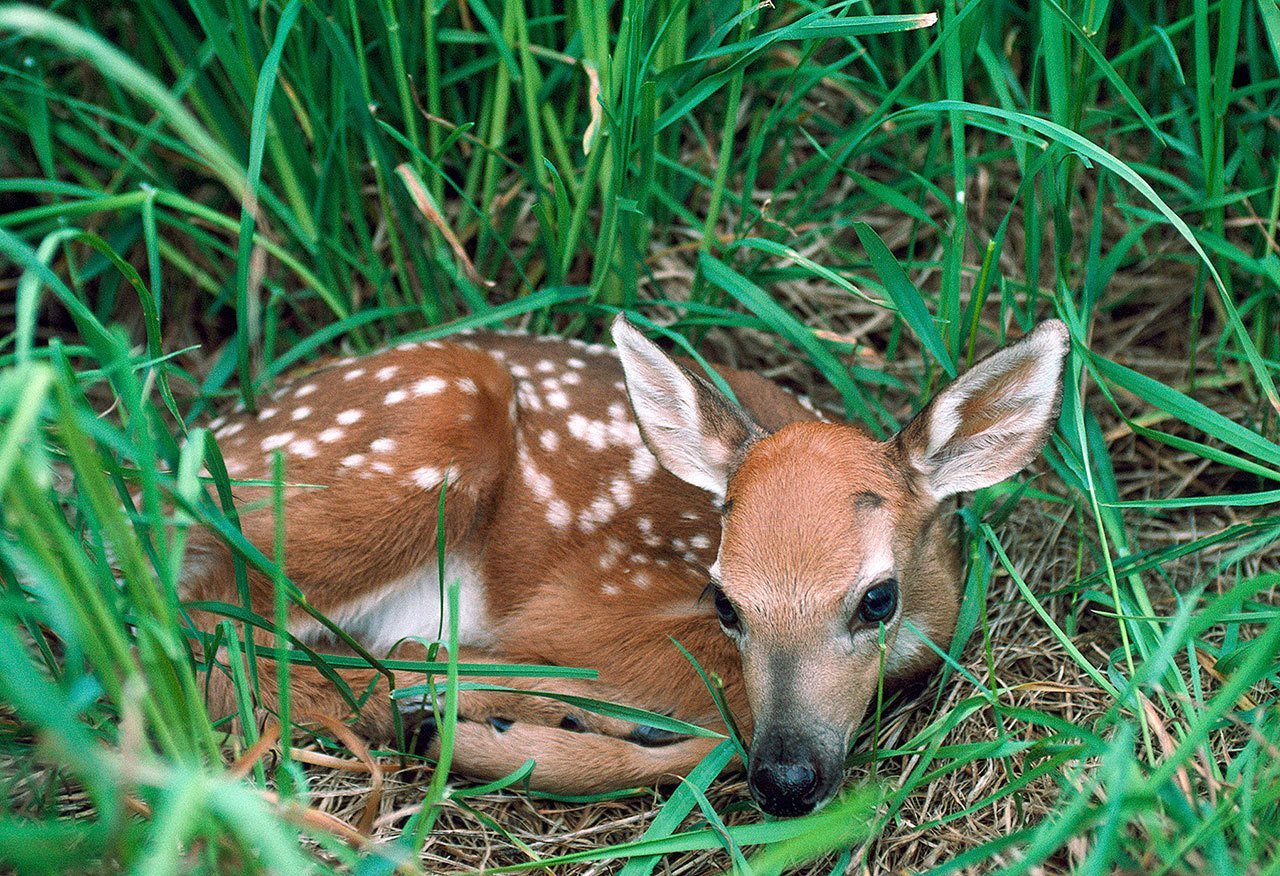By Rich Landers
The Spokesman-Review
The great outdoors is a giant nursery this time of year.
Birds are hatching; calves and fawns are dropping. The year’s crop of critters is bubbling out of nests, dens and thickets just as nature is stocking the pantry with bugs and nutritious new greenery.
The spectacle is delightful for wildlife watchers, and a cause for restraint. Occasionally baby critters will be spotted alone, as though they were abandoned. People who don’t know nature’s ways sometimes are tempted to “rescue” the baby.
That’s why wildlife agencies in Washington, Idaho, and Montana have been pumping out the message in the past month: If it’s a wild thing, but not your own child, it’s best to leave it be.
There’s more than one reason why it’s illegal to take wildlife from the wild
The fiasco in Yellowstone National Park last month put the spotlight on the rule as tourists scooped up a “shivering” calf bison and took it to a ranger in their SUV. After the herd would not accept the calf back, the calf was dispatched. The tourists were fined. Perhaps wolves were denied a meal opportunity.
Everybody was a loser.
This sort of thing has happened on the coast, as good-hearted but poorly informed people have rescued “abandoned” harbor seal pups. The prospects for “rescued” young seals are grim, even if a wildlife rehab unit has room to take them in.
Harbor seal moms sometimes leave a pup on the beach for hours as they swim out looking for food.
Speaking words of wildlife wisdom: Leave it be.
Similarly, deer and other big-game animals can leave their fawns and calves lying motionless in the grass for lengthy periods — perhaps six or more hours — until mom senses it’s safe to return.
Does head off alone to forage so predators attracted to their body scent are lured away from the offspring, said Mick Cope, Washington Department of Fish and Wildlife game program manager.
Young wildlife produce little scent when left alone, low and motionless. Their moms often lick them clean and eat or pack away their feces to reduce odor.
“Even with the best intentions, removing animals from the wild greatly reduces their chance of survival,” Cope said.
There will be an answer: Leave it be.
Baby birds can show up anywhere this time of year, including your front porch as it’s common for chicks to leave the nest before they are fully feathered or flight-ready.
“They will be fed on the ground for a day or two by the parents until they are able to fly,” said Madonna Luers, WDFW spokeswoman in Spokane.
“Careful observation before distressing and collecting these animals should help you make a correct decision whether or not they are truly orphaned or injured and need help.
“Very young birds sometimes fall out of nests. If you can safely reach the nest, put it back.” In the case of birds, adults will not reject their young because they’ve been touched by humans, she said.
“If the bird is older or you cannot find the nest, place it in a tree or shrub or on a shaded portion of a roof, out of the way of cats, dogs and children,” she said.
“Do not unnecessarily handle or move it from the general area where it was found. If a baby bird shows obvious signs of illness or injury, call a wildlife rehabilitator first and describe what you see.”
Picking up big-game babies is widely discouraged. In Montana, the Fish, Wildlife & Parks Department no longer accepts, holds or rehabilitates deer and elk.
“Diseases (such as Chronic Wasting Disease) are a concern when moving deer and elk, and raising fawns and calves is often unsuccessful,” the agency said in a statement. Costly, too.
“All wildlife species and their young should be left in the wild. If you see a baby animal, whether a goose or a grizzly, keep your distance and leave it alone.”
Mother elk, moose and bears have been known to come out of nowhere and defend their wild babies against approaching people.
“Handling baby animals can be dangerous and usually once young animals are picked up by people they can’t be rehabilitated,” Montana’s agency says. “They are often abandoned by adult animals once human scent is transferred to them.”
While WDFW may attempt to place displaced animals with wildlife rehabilitators, many of the critters do not survive, Cope said. In rare cases, after sometimes days of monitoring, bear cubs or mountain lion kittens have been collected for rehab, Luers said.
“If people want to help, we ask that they give young wildlife a wide berth and restrain pets that might harass them,” Cope said. “Cats, in particular, can take a toll on songbirds if they’re left to roam outdoors.”
A marked increase in reports of “rescued” wildlife has occurred in recent weeks, said Tina Hamilton, WDFW’s statewide law enforcement dispatcher.
“We recently had a situation where someone picked up a newborn fawn and left it at a fire station in rural Pierce County,” Hamilton said.
“That fawn still had its umbilical cord, so how far away could its mother have been?”
Bottom line: For though they may have parted, leave it be.
What can you do?
Leave it there. It’s natural for wildlife such as deer and elk to leave their young alone for extended periods. What appears to be an orphaned animal may not be.
Control dogs. Pets can be a threat to wildlife, especially in the spring when newborn birds and wildlife are most vulnerable.
Mind the law. It is illegal to possess and care for a live animal taken from the wild.
Review the Washington Fish and Wildlife Department’s Living with Wildlife website.
Talk to us
> Give us your news tips.
> Send us a letter to the editor.
> More Herald contact information.

























